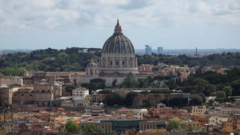As global leaders gather in Rome to pay homage to Pope Francis, the event presents an unusual backdrop for international interactions aiming to resolve ongoing conflicts and foster new dialogues.
Pope Francis's Funeral: A Setting for Diplomatic Encounters

Pope Francis's Funeral: A Setting for Diplomatic Encounters
World leaders may use the occasion of Pope Francis's funeral for informal diplomacy.
The anticipated funeral of Pope Francis has drawn heads of state and government from around the globe, creating a unique environment for diplomatic interactions amid a solemn occasion. Scheduled for Saturday, this event marks one of the largest assemblies of world leaders since the passing of Queen Elizabeth II in 2022. Although there are no formal meetings planned to respect the gravity of the situation, diplomats suggest that there will be ample chances for informal "brush-by" conversations as leaders pass one another in St. Peter's Square.
In light of the geopolitical tensions particularly between Presidents Donald Trump and Volodymyr Zelensky, many are watching closely to see if the two will seize the moment to discuss a potential ceasefire in Ukraine. Creatively navigating seating arrangements due to the traditional allocation by alphabetical order, their proximity could become a point of interest, despite the historic language of French dictating assigned spots throughout the ceremony.
While previous interactions have been fraught with tension, the informal settings outside the official ceremonies could allow both leaders to communicate more freely. Diplomatic sources also noted that while they await the typically bustling event, a significant number of delegations with heads of state, government officials, and royalty will attend, fostering many opportunities for casual networking.
Despite the potential for diplomatic breakthroughs, there are inherent risks; politicians under European sanctions could find themselves in close quarters with those they would prefer to avoid. Notably absent from the gathering are key figures like Vladimir Putin and Xi Jinping, which only adds to the dynamics of the gathering.
The ceremony itself will involve shared gestures of peace among participants, potentially leading to politically awkward moments reminiscent of past global gatherings. As seen during the funeral of Pope John Paul II in 2005, surprising interactions sparked controversy and public sentiment, underlining the unpredictable nature of such events.
In sum, with the ghost of significantly impactful funerals lingering in recent memory, the occasion may once again serve as fertile ground for not just mourning, but the complex interplay of international relations, providing leaders a chance for important dialogues cloaked in the gravity of loss.
In light of the geopolitical tensions particularly between Presidents Donald Trump and Volodymyr Zelensky, many are watching closely to see if the two will seize the moment to discuss a potential ceasefire in Ukraine. Creatively navigating seating arrangements due to the traditional allocation by alphabetical order, their proximity could become a point of interest, despite the historic language of French dictating assigned spots throughout the ceremony.
While previous interactions have been fraught with tension, the informal settings outside the official ceremonies could allow both leaders to communicate more freely. Diplomatic sources also noted that while they await the typically bustling event, a significant number of delegations with heads of state, government officials, and royalty will attend, fostering many opportunities for casual networking.
Despite the potential for diplomatic breakthroughs, there are inherent risks; politicians under European sanctions could find themselves in close quarters with those they would prefer to avoid. Notably absent from the gathering are key figures like Vladimir Putin and Xi Jinping, which only adds to the dynamics of the gathering.
The ceremony itself will involve shared gestures of peace among participants, potentially leading to politically awkward moments reminiscent of past global gatherings. As seen during the funeral of Pope John Paul II in 2005, surprising interactions sparked controversy and public sentiment, underlining the unpredictable nature of such events.
In sum, with the ghost of significantly impactful funerals lingering in recent memory, the occasion may once again serve as fertile ground for not just mourning, but the complex interplay of international relations, providing leaders a chance for important dialogues cloaked in the gravity of loss.





















